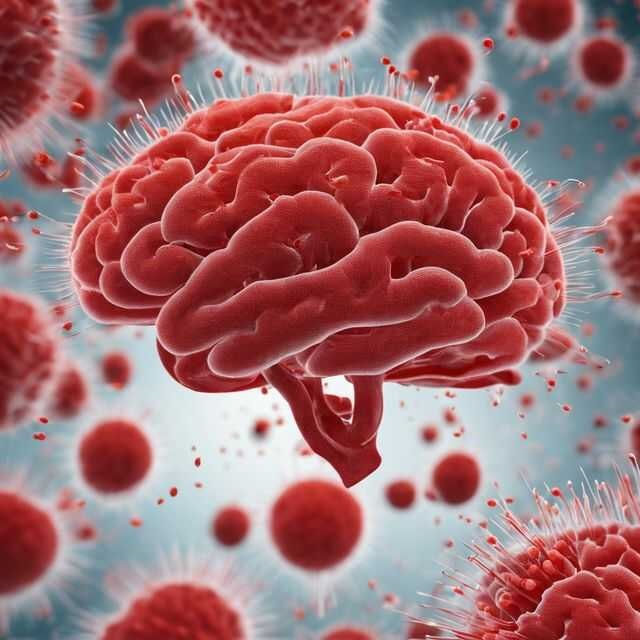Astaxanthin, a naturally occurring carotenoid pigment responsible for the vibrant coloration of certain marine organisms, has garnered significant attention in the realm of nutritional neuroscience. This potent antioxidant is synthesized by microalgae, yeast, salmon, trout, krill, shrimp, and crayfish, with Haematococcus pluvialis being the richest known natural source. In recent years, astaxanthin has been rigorously investigated for its potential neuroprotective properties. This article provides an overview of the current scientific understanding of astaxanthin's role in brain health, with a particular focus on clinical trials and the underlying biological mechanisms.

Clinical Evidence for Astaxanthin's Neuroprotective Effects
Several randomized, double-blind, placebo-controlled studies serve as the cornerstone for evaluating astaxanthin's efficacy in supporting brain health. One notable investigation involved a 3-month supplementation with natural astaxanthin extract from Haematococcus pluvialis at a daily dosage of 12 mg. The study's participants were senior subjects experiencing age-related cognitive decline, such as forgetfulness. The results demonstrated significant improvements in mental speed, multitasking, memory retention, and learning capacity.
Another clinical trial assessed the impact of astaxanthin on cognitive function in a group of healthy middle-aged and elderly individuals. Over 12 weeks, subjects receiving astaxanthin exhibited enhanced markers of cognitive function compared to the placebo group. These findings suggest that astaxanthin supplementation may confer cognitive benefits in an aging population.
Benefits of Natural Astaxanthin for Brain Health
Improving Age-Related Forgetfulness, Multitasking, and Alertness
Age-related cognitive decline is a major concern in an aging global population. Astaxanthin's ability to cross the blood-brain barrier allows it to exert direct antioxidant effects within the central nervous system. By neutralizing free radicals and reducing oxidative stress, astaxanthin may help mitigate the cellular damage that contributes to age-related forgetfulness and cognitive slowing. Additionally, astaxanthin has been shown to improve synaptic plasticity, which is crucial for learning and memory.
Decreased Oxidation of Red Blood Cells and Dementia Prevention
Oxidative stress is implicated in the pathogenesis of various neurodegenerative diseases, including dementia. Astaxanthin's potent antioxidative properties extend to the protection of red blood cells from oxidative damage. By preserving red blood cell integrity, astaxanthin ensures efficient oxygen delivery to the brain, which is essential for optimal neural function. This protective effect may contribute to the prevention or delay in the onset of dementia.
Improved Capillary Blood Flow and Antioxidant Quality in the Blood
Astaxanthin has been observed to enhance capillary blood flow, thereby improving nutrient and oxygen delivery to brain tissues. Enhanced blood flow is critical for maintaining cognitive function and preventing ischemic conditions that could lead to stroke or other cerebrovascular accidents. Moreover, as a powerful antioxidant, astaxanthin improves the overall antioxidant capacity of the blood, providing systemic benefits beyond cerebral circulation.
Regulation of Blood Pressure and Endothelial Health
High blood pressure is a well-known risk factor for stroke and cognitive decline. Astaxanthin has been reported to regulate blood pressure by promoting vasodilation and improving endothelial function. The endothelium plays a key role in vascular health; its dysfunction is associated with atherosclerosis and subsequent cerebrovascular events. Astaxanthin's ability to improve endothelial health may lower the risk of stroke and contribute to the maintenance of cognitive abilities.
Biological Mechanisms Underlying Astaxanthin's Neuroprotective Properties
Astaxanthin's neuroprotective effects are primarily attributed to its antioxidative and anti-inflammatory properties. As an antioxidant, astaxanthin is capable of scavenging reactive oxygen species (ROS) and nitrogen species (RNS), which are detrimental to cellular components such as lipids, proteins, and DNA. Its unique molecular structure allows it to span across cell membranes, providing robust protection against lipid peroxidation and maintaining membrane integrity.
Moreover, astaxanthin has been shown to modulate several signaling pathways associated with inflammation and cell survival. For instance, it inhibits the nuclear factor kappa B (NF-κB) pathway, which is involved in the expression of pro-inflammatory cytokines. Astaxanthin also activates the nuclear factor erythroid 2–related factor 2 (Nrf2) pathway, which upregulates the expression of endogenous antioxidant enzymes.
The carotenoid also exerts neurotrophic effects by promoting the expression of brain-derived neurotrophic factor (BDNF), a protein essential for neuronal growth, differentiation, and synaptic plasticity. This action further contributes to astaxanthin's ability to support cognitive function and neural resilience.
Conclusion
The body of evidence from clinical trials suggests that astaxanthin holds promise as a dietary supplement for enhancing brain health, particularly in populations at risk for age-related cognitive decline. Its multifaceted biological effects on the brain—ranging from antioxidative and anti-inflammatory actions to improvements in cerebral blood flow and vascular health.
WARNING: The information provided on this page is intended for general informational purposes only and should not be considered as a substitute for professional medical advice, diagnosis, or treatment. Always seek the guidance of a qualified healthcare professional for any questions or concerns you may have regarding your health or a specific medical condition. The content on this page is not intended to replace a one-on-one consultation with a healthcare practitioner nor does it guarantee treatment or the indication for treatment. Reliance on any information provided on this page is solely at your own risk. Please consult your healthcare provider before making any decisions about your health or treatment options.

Comments